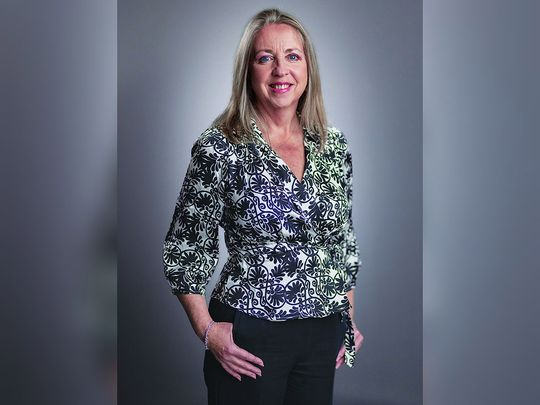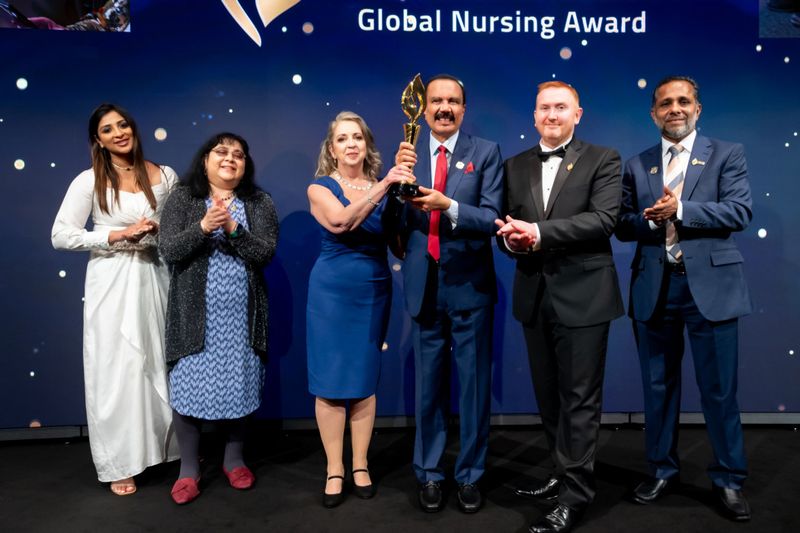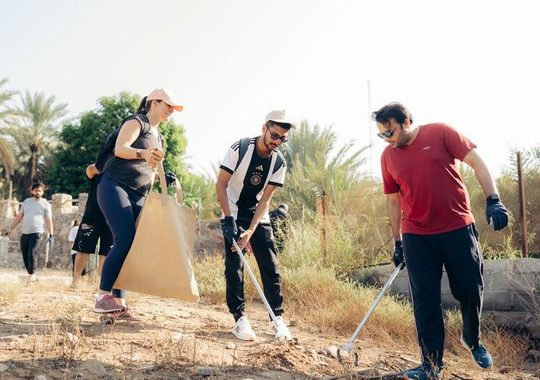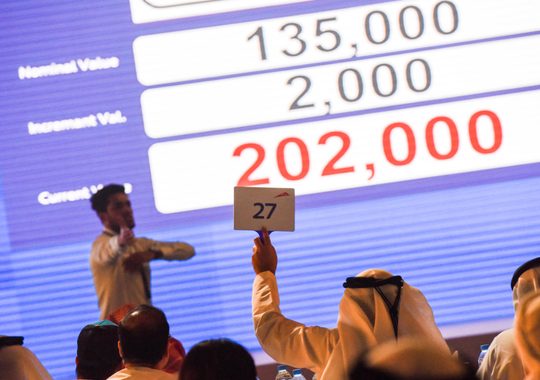UK nurse who won UAE health group’s $250,000 award funds genetic tests in quest for right treatment of diabetes

Image Credit: Supplied
Dubai: From Bahrain to Bosnia and from Peru to Pakistan, newborn babies are getting free genetic tests for a rare type of diabetes, 80 per cent cases of which usually go undiagnosed, thanks to a $250,000 award for nurses instituted by the UAE-headquartered healthcare group Aster DM Healthcare.
This has been made possible because the UK-based nurse Margaret Helen Shepherd, the winner of the second edition of the Aster Guardians Global Nursing Award, has dedicated a large portion of the prize money to the cause of diabetes care, especially in the realm of little-known monogenic diabetes. It is a rare condition resulting from mutations (changes) in a single gene. In contrast, the most common types of diabetes—type 1 and type 2—are caused by multiple genes and lifestyle factors such as obesity in type 2 diabetes.

Image Credit: Supplied
Speaking to Gulf News ahead of World Diabetes Day, observed on November 14, Shepherd revealed the impact of winning the award on her life and career, especially in the context of her expertise in monogenic diabetes in babies.
An Associate Director of Nursing Research and Honourary Clinical Professor of Monogenic Diabetes at the Royal Devon University Healthcare NHS Foundation Trust, the 60-year-old mother of three pipped more than 52,000 competitors from 202 countries on the eve of International Nurses’ Day in May.
The timing was perfect because her initiative to provide access to genetic testing for neonatal monogenic diabetes through a national network of genetic diabetes nurses in the UK was facing challenges in sustaining funding.
“We had originally had a grant that had funded the neonatal diabetes testing and that grant ran out,” she recalled in a virtual interview.
“Then we started trying to do some crowdfunding, and we weren’t massively successful with that, to be quite honest.”
However, Shepherd’s commitment to offering genetic testing for free extended beyond borders because genetic testing remains costly. Also, because there is a much higher incidence of neonatal diabetes due to autosomal dominant or recessive causes in countries with high levels of consanguinity where people, for example, may marry their first cousins.
“So the funds from this award have been able to support that free testing so that if we get a phone call from a clinician from a country where either the family or the healthcare system can’t afford that genetic testing, then we’re able to fund that from the fund that we have for our neonatal diabetes testing.”
Providing the latest figures, she said: “From September 2022 to August 2023, we provided free genetic testing for 65 individuals from 50 different clinicians who had referred them in 31 different countries.”
Several of these tests done after May were funded with her prize money.
On a personal level, Shepherd noted that winning the award boosted her confidence in the work she does in Exeter, England. She highlighted the diverse roles nurses can play in research, clinical care, education, and leadership. The award served as a platform to spread awareness globally, reaching areas previously untouched by her efforts, she acknowledged.
Why genetic testing?
Neonatal diabetes, though rare, affects around 1600 new cases globally each year. Many cases of monogenic diabetes are inherited, making up 2-5 per cent of global diabetes cases.
Shepherd’s research found a 2.5 per cent prevalence in the UK’s pediatric diabetes population, mostly managed with tablets, not insulin.
Kids diagnosed with diabetes under six months (neonatal diabetes) likely have a single gene change. Hence, genetic testing is crucial as at least 50 per cent can be treated with tablets, not insulin, greatly improving their life.
She pointed out that 80 per cent with monogenic diabetes are initially misdiagnosed as Type 1 or despite its importance, over 80 per cent of cases remain undiagnosed.
Shepherd also explained the distinction between permanent and transient forms of neonatal monogenic diabetes. The former requires ongoing treatment, while the latter may remit and reappear later during teenage. Genetic testing plays a crucial role in determining the specific course of treatment for each case, offering more stable and cost-effective solutions, she highlighted.
The Middle East and North Africa have the world’s highest diabetes incidence, with 192,500 kids having Type 1.
UAE case
Shepherd’s association with testing patients from the UAE dates back several years. “We have received cases from the UAE, including an Indian child with neonatal diabetes. Genetic testing revealed an ABCC8 gene mutation. After switching to a specific tablet, she stopped insulin at two days, normalised blood sugar at three months, and is now six years old. While diabetes may return in her teens, she can transition to tablet treatment, marking a successful case with positive outcomes.”
Changing treatment
When a sick baby first presents, she said, quick blood glucose reduction with insulin is crucial. However, for specific genes like ABCC8 and KCNJ11, a particular tablet offers more stable blood glucose, making management easier.
She said it allows the babies to produce their own insulin, leading to stability and reduced blood glucose monitoring needs. These tablets are often cheaper than insulin, and for some, they aid neurological function, addressing learning difficulties.
“Accurate diagnosis is vital for tailored treatment, offering significant benefits.”
Healthcare professionals need to know about the existence of monogenic diabetes, understand the need for genetic testing, and know how to support those correctly diagnosed to change a lifetime of unnecessary insulin treatment.
Since the start of the Genetic Diabetes Nurses Network in 2002, referrals for genetic testing have continued to increase, with around 4,500 patients in the UK with a confirmed diagnosis of monogenic diabetes. In the past two years, this model of training was extended through work with NHS England to provide free virtual training to healthcare professionals across England.
“This resulted in a further 1,054 staff trained since 2021, with 95 per cent of hospitals in England, offering a diabetes service, having a trained and named monogenic diabetes lead,” said a proud Shepherd.
She said free virtual training courses and resources are available for clinicians to stay updated. It’s crucial to maintain awareness, as cases may be infrequent, and continuous discussion is essential for effective management. Clinicians can also join training on December 5 and 6 on the website of Diabetes Genes.”
Encouraging all nurses to apply for the Aster Guardians Global Nursing Award, Shepherd said she cherishes the friendship made with the other finalists as well. “What was a phenomenal opportunity was also to meet the other nine finalists, who were all superb to hear about the work that they’re doing, many of them in countries where they have far fewer resources than we do in the UK. We’re all still in touch. We’ve all been supporting each other.”
2024 edition in Bangalore
Meanwhile, Aster DM Healthcare said the Aster Guardians Global Nursing Award 2024 worth $250,000 again will be held in Bengaluru (Bangalore), India.
The deadline for submissions has been extended to December 15 due to an overwhelming global response of 40,000-plus registrations from over 130 countries.
Nurses from around the world can submit their nominations via the website of Aster Guardians.


